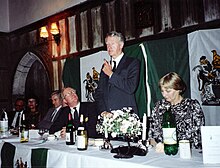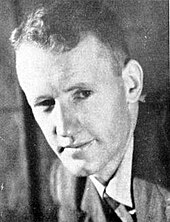Ian Smith
Ian Douglas Smith (born April 8, 1919 in Selukwe (today Shurugwi ), Southern Rhodesia , † November 20, 2007 in Cape Town , South Africa ) was a Rhodesian politician. He was Prime Minister of Rhodesia , now Zimbabwe , from 1964 to 1979 .
Life
Smith came from a Scottish family. He was born in what was then the British colony of Southern Rhodesia and grew up there. He completed his studies at the South African Rhodes University . During World War II he served as a pilot in the British Royal Air Force in Europe and North Africa, and in 1945 he returned to his tobacco farm in Rhodesia.
Smith was a co-founder of the Rhodesian Front in the early 1960s , which campaigned on the one hand for the independence of the country, but on the other hand also to maintain the supremacy of the white minority. He refused to allow the black majority of the population to take part in government in 1964, which is why the declaration of independence in Southern Rhodesia in 1965, which was now called Rhodesia, was not recognized internationally. Despite economic sanctions and failed negotiations with the British colonial power, the government under Smith Rhodesia issued a new constitution in 1969 and proclaimed the republic in 1970.
As a result of this step, all states accredited in Salisbury , except South Africa, withdrew their diplomatic representatives.
The white minority government came under increasing pressure from the guerrilla war of ZAPU and ZANU , the fight against which devoured all resources. As part of this development, Smith increasingly sought intensive cooperation with South Africa. In 1970 he made several government visits to Pretoria . South African Prime Minister Vorster paid a state visit to Smith in May.
A Rhodesia conference held in Geneva in 1976/77 remained unsuccessful. Numerous discussions followed with international government representatives. On September 20, 1976, Smith met Henry Kissinger for extensive talks in Pretoria, in which Premier Vorster also took part. Kissinger had made concrete proposals to Smith for the solution of the internal Rhodesian conflict, which included a power participation of black politicians. They formed the basis for further concrete steps.
In 1978, Smith agreed with a number of moderate, conservatively oriented black politicians on general elections and thus a participation of the black majority in the government. In 1979 the black bishop Abel Muzorewa became prime minister and Ian Smith became his deputy, but was not recognized internationally or by ZANU and ZAPU . It was not until the Lancaster House Agreement brokered by Great Britain that an agreement was reached between the Rhodesian government and ZANU and ZAPU in 1979. After a transitional period in which Rhodesia was again administered as a British crown colony, the country now officially known as Zimbabwe became independent on April 18, 1980.
In the years that followed, Smith was opposition leader on the Republican Front . However, the support of his policy on the part of the white minority decreased more and more, nevertheless his party still managed to win 15 of the 20 parliamentary seats intended for the white minority in the 1985 elections. However, President Robert Mugabe abolished these guaranteed seats two years later, and Smith then retired to his farm. In 2005 he emigrated to South Africa, where he died on November 20, 2007. He held on to his positions until the end, especially during the economic decline of Zimbabwe after 2000. The farm he left to his family after his death was confiscated by the state in 2012 as part of an expropriation proceedings.
literature
- R. Kent Rasmussen (Ed.): Historical Dictionary of Rhodesia / Zimbabwe (= African Historical Dictionaries. Volume 18). 1st edition. Scarecrow Press, Metuchen / London 1979, ISBN 0-8108-1187-1 .
Web links
- Ex-Rhodesia leader Ian Smith dies ; BBC announcement of November 21, 2007
- Obituary: Ian Smith ; BBC announcement of November 20, 2007 (English)
- Alan Cowell: Ian Smith, Defiant Symbol of White Rule in Africa, Is Dead at 88 ; Portrait of Ian Smith in the New York Times, November 21, 2007
Individual evidence
- ^ A b SAIRR : A Survey of Race Relations in South Africa 1970 . Johannesburg 1971, p. 70
- ^ SAIRR: A Survey of Race Relations in South Africa 1976 . Johannesburg 1977, pp. 451-453
| personal data | |
|---|---|
| SURNAME | Smith, Ian |
| ALTERNATIVE NAMES | Smith, Ian Douglas (full name) |
| BRIEF DESCRIPTION | Rhodesian politician, Prime Minister of Rhodesia |
| DATE OF BIRTH | April 8, 1919 |
| PLACE OF BIRTH | Selukwe (now Shurugwi ), Rhodesia |
| DATE OF DEATH | November 20, 2007 |
| Place of death | Cape Town |

